AI Answer Evaluation Platform Live Now. Try Free Answer Evaluation Now
Dispute Settlement in Pre-Literate Societies
Dispute settlements mechanisms play a crucial role in maintaining the order and harmony in any society. In pre-literate societies, without formal codified laws or law enforcement institutions, dispute resolution was still essential for social cohesion and survival.

Oath and Ordeal: Instruments of Justice
Oath-Taking as Evidence
In pre-literate societies, oaths were used as a form of verbal contract that was considered binding and sacred [1]. Oaths served as a method for truth-verification in dispute settlements:
- Accuser’s Oath: The person lodging the complaint swore to the truth of their accusations.
- Defendant’s Oath: The accused swore to their innocence or lack of guilt.
The breach of an oath was considered a grave sin, attracting severe social and sometimes supernatural sanctions, which helped ensure compliance [2].
Trial by Ordeal
Trial by ordeal was another form of dispute resolution where the accused had to undergo physical trials or tests to determine guilt or innocence. Examples of such trials include:
- Ordeal by Fire: The accused had to carry a hot iron or walk through fire.
- Ordeal by Water: The accused was thrown into water to see if they would sink (innocent) or float (guilty).
The outcomes of these ordeals were believed to be guided by divine or supernatural intervention, thereby substantiating the judgments rendered [3].
Punishments: A Tool for Deterrence
Punishment in pre-literate societies served the dual purpose of retribution and deterrence. Without a formal police force, punishments often were of a public and communal nature, providing immediate justice and serving as a strong deterrent for others [4].
Punishments varied significantly, depending on the severity of the crime and societal norms, and could range from fines and compensation, public shaming, to corporal punishment and even death [5].
| Crime | Typical Punishment |
|---|---|
| Theft | Compensation; Public Shaming |
| Murder | Death; Blood Money (Weir Guild) |
| Adultery | Public Shaming; Corporal Punishment |
Weir Guild (Compensation): Mitigating Conflict
The concept of the Weir Guild, or compensation in pre-literate societies, was one of the earliest forms of restorative justice. It was intended to:
- Compensate the victim or their family for their loss.
- Avoid further conflict or retaliation, preserving peace in the community.
The amount or type of compensation depended on the nature of the crime and the status of the individuals involved.
The Anthropological Perspective: A Deeper Understanding
While the dispute settlement mechanisms of pre-literate societies may seem crude or primitive to some modern observers, they should be understood in their proper historical and cultural context. An anthropological perspective reveals the sophistication and adaptability of these systems, as well as the ways in which they evolved in response to the needs and challenges of their times.
Oath-taking: Beyond the Literal
From an anthropological viewpoint, the act of oath-taking in these societies is far more than a mere declaration of truth. It is a performative act that binds the individual to the community and to the metaphysical realm. This act served to strengthen communal bonds and underscore the importance of truth and integrity within the society.
Trial by Ordeal: The Power of Belief
The trial by ordeal represents a fascinating intersection of law, religion, and community in pre-literate societies. These trials were often a public spectacle, reinforcing the collective belief in divine justice and the power of community judgement. The ordeal, hence, was a deeply ingrained cultural practice serving multiple social functions, including dispute resolution and community bonding.
Punishment: The Public and the Private
While public punishments may seem harsh to contemporary observers, they served the function of reinforcing societal norms and deterring potential criminals in a society without a professional law enforcement agency. However, private punishments, including compensation and the Weir Guild, also played an important role in maintaining social order. These punishments focused on restoring balance rather than exacting retribution, demonstrating a nuanced understanding of justice that has relevance even in today’s restorative justice discourse.
The Weir Guild: An Early Form of Restorative Justice
The concept of the Weir Guild, often understood as compensation, offers insight into an early form of restorative justice. It functioned not only as a form of punishment but also as a method of restoring peace and balance in the community, particularly after violent conflicts. This idea of restorative justice continues to inform many contemporary justice systems and offers a valuable lesson from pre-literate societies about the importance of community and reconciliation in the justice process.
Conclusion
In conclusion, the study of dispute resolution mechanisms in pre-literate societies offers an important window into the complexity of these societies and their sophisticated approach to maintaining social order. Despite their lack of written laws or formal institutions, these societies developed effective systems for resolving disputes, preventing conflicts, and upholding social norms. These early justice systems reflect the resilience and adaptability of human societies and offer important lessons for our understanding of justice and community today.
References
[1] Gluckman, Max. (1955). The Judicial Process among the Barotse of Northern Rhodesia.
[2] Atran, Scott. (2002). In Gods We Trust: The Evolutionary Landscape of Religion.
[3] Bartlett, Robert. (1986). Trial by Fire and Water: The Medieval Judicial Ordeal.
[4] Foucault, Michel. (1977). Discipline and Punish: The Birth of the Prison.
[5] Diamond, Jared. (1997). Guns, Germs, and Steel: The Fates of Human Societies.




